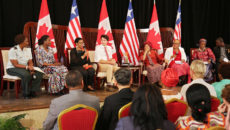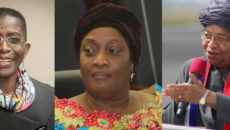As a young Liberian woman studying in the United States, I would love to move back to Liberia to incite some degree of change for my people. But I am afraid. While I want to return after I graduate, I do not feel protected in Liberia. I do not feel like my nation will have my back no matter what.
I am afraid that my voice will be silenced — afraid that my voice will be censored. I am afraid that I will not be able to turn to my nation in times of danger.
I say this because of several recent instances that have revealed how young women are treated in the nation.
In mid-November of last year, the actions of General Services Agency Director Mary Broh caused necessary controversy for her public flogging of young girls on the streets of Monrovia. The underage girls, suspected of being sex workers, were reprimanded by Broh through public whippings and humiliation.
Broh went on to defend the situation in a statement, saying, “I did nothing wrong, the bible says spare not the rod and the let the child spoil. I did not whip any of the girls 50 lashes, there were three of them and one of them was a teenager and I am told that the smaller one normally goes there [the area of alleged prostitution].â€
She continued, “I am not going to say what you normally say in the raw way but she does tricks and so I grabbed her, I had a little switch in my hand and I gave her three lashes on her buttock.â€
In a more recent case that started in 2015, a Lebanese man who was indicted for the trafficking, smuggling, and gang rape of sixteen young Liberian women was being released on bail after a hung jury.
Front Page Africa reported that Abbas El Debes is currently out of prison on a US$100,000 bail for all the charges even though gang rape is not a bailable offense. Is the innocence and basic human rights of sixteen of its young women worth only US$100,000 to the Liberian judicial system?
These two situations are just the tip of the iceberg. It’s a bit scary that most Liberians know at least one woman or young girl who has been raped, but received no justice. Rape was used as a weapon of war during the 14-year conflict and continues to be prevalent in post-war countries. As many sexual predators take advantage of the lack of repercussions for crimes against women, many Liberian women and young girls have been victims of sexual assault, human trafficking, and, more commonly, statutory rape.
Most of us know young Liberian girls who have a “God-Pa.†Girls as young as 13 are “dating†older men in exchange for them and their families to be financially taken care of by these men. Instead of these young girls being viewed as victims, this is mostly seen as a normal occurrence. This creates victims of a judicial system that is failing to be their voice — victims of a system that is failing to protect them, to protect US.
These examples may paint a bleak picture of Liberia for women, however, I don’t believe it is ALL negative.
There are ample opportunities available in Liberia for young women. A lot of the current initiative being presented, and programs being implemented in Liberia, are for the benefit of women.
For example, the founder of the Mango Rags Boutique, Archel Bernard, is expanding on her brand to include a Bombchel Kickstarter campaign which will direct proceeds toward teaching female survivors of Ebola skills like sewing and tie-dying.
Another example is a project of my mother, the Founder and CEO of Business Link Inc., Edwina Vakun-Licoln. The 5 By 20 Project is an initiative being launched in partnership with Coca-Cola. It is currently in the implementation phase but by the time it is over, it will have provided 1,000 female Ebola survivors with financial independence through skills training and equipped 500 orphaned girls with scholarships.
Along with these initiatives, most jobs being offered strongly encourage females to apply. Additionally, there are campaigns and actions being taken against domestic abuse against women.
With all these great things being done for girls and women in Liberia, it leaves me with hope that much more will be done for us. Although I still feel unprotected and afraid, I do know that it will only get better for us as young Liberian women.
As we can see with all the strong and resilient women who currently hold high positions of power in the Liberian government — including Africa’s first female President, Madame Ellen Johnson Sirleaf — we have great women before us to emulate.
They have paved a way of greatness and presented us with opportunities to get on that road with them. It is now our duty, as young Liberian women, to take full advantage of these opportunities while they still exist.
Yes, the system fails us in many ways, especially when it comes to protecting us. While it leaves us feeling very vulnerable, we must still use the little protection that it does provide and become even greater women who will use their voices and their actions to continue demanding change.
Liberia has produced many great women, and will continue molding even greater women in years to come, no matter what.
Featured photo courtesy of Adrienne Tingba



